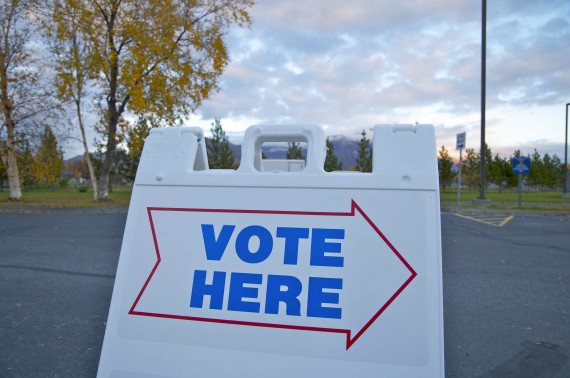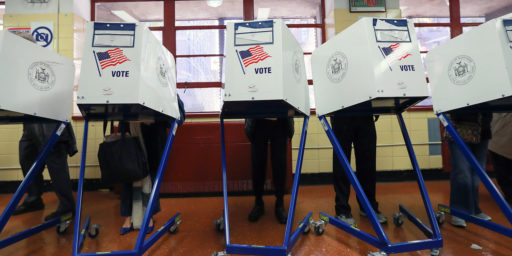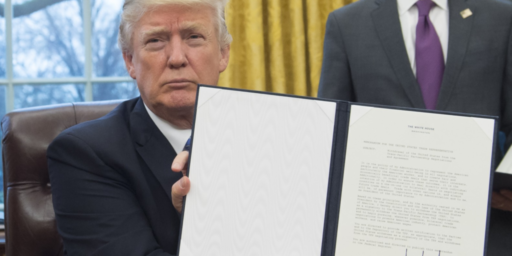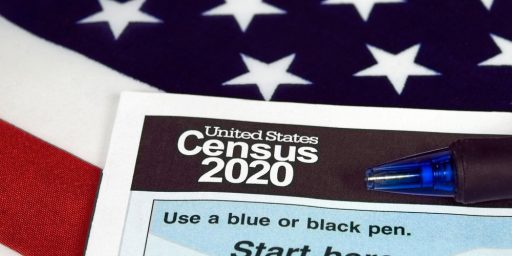Tenth Circuit Bars Effort By Kansas, Arizona To Add To Requirements For Voter Registration
States may not add to Federal requirements for voter registration, the Court rules. Which makes perfect sense.
A unanimous panel of the 10th Circuit Court of Appeals has rejected an effort by Kansas and Arizona to essentially make an end run around Federal Law by making additions to the documents required to be presented when someone registers to vote using the form created by the U.S. Election Assistance Commission [EAC] under a 1993 law called the National Voter Registration Act, [NVRA] popularly known as the “Motor Voter Bill” because it introduced the now common practice of allowing people to register to vote at the same time they apply for a driver’s license:
A federal appeals court on Friday handed a significant setback to Kansas Secretary of State Kris Kobach’s efforts to require all new and re-registering voters to provide a document proving citizenship.
The 10th Circuit Court of Appeals in Denver ruled that Kansas cannot require proof-of-citizenship documents — almost always a birth certificate or passport — from prospective voters who register using a federal voter registration form. The court also said that a federal agency doesn’t have to alter the form to fit Kansas requirements.
Arizona has a similar proof-of-citzenship requirement, and Kobach argued the case on behalf of both states in conjunction with Arizona Secretary of State Ken Bennett.
The Kansas requirement is separate from a section of state law requiring voters to show photo ID at the polls.
U.S. District Judge Eric Melgren in Wichita had ruled that the Election Assistance Commission, a federal agency, was required to add state-specific citizenship proof requirements to the instructions for using the federal form in Kansas and Arizona. The appeals court overturned Melgren’s ruling.
“I am very pleased, obviously,” said Dolores Furtado, president of the Kansas chapter of the League of Women Voters. “It’s a good feeling because we’re truly trying to help” people get registered to vote.
The national and state leagues had intervened in the case on the federal agency’s side, along with a host of voting rights groups including Common Cause, Project Vote and the Inter Tribal Council of Arizona.
Kobach could not be reached for comment late Friday.
Furtado said the league’s main interest is in increasing participation in the democratic process “rather than trying to make more hoops, more steps, to go through.”
The federal form, enabled by the National Voting Rights Act, was meant to create a common voter registration card that could be used to register across the country.
Most Kansas voters register with a state form available at election and drivers license offices around the state. The federal form generally has to be downloaded from the Internet.
The primary difference between the federal and Kansas registration forms is that the Kansas form requires prospective voters to show documents proving citizenship, while the federal form requires a signature under penalty of perjury to prove citizenship.
As part of its ruling, the court said Kansas and Arizona have other ways to check voter citizenship that are less burdensome for voters than requiring them to provide their birth records.
A decision by the executive director of the federal commission “discussed in significant detail no fewer than five alternatives to requiring documentary evidence of citizenship that states can use to ensure that noncitizens do not register using the Federal Form,” the court ruling said. “Kobach and Bennett do not dispute that these means exist and merely contend that they are overly onerous.”
The appeals court also rejected Kobach’s contention that the executive director of the commission didn’t have the authority to reject the state’s request.
The court said it was a valid exercise of power by the executive director in the absence of a quorum of commissioners. The commission currently has no members because of Senate gridlock over President Barack Obama’s nominees.
The appellate court decision could open a loophole in Kansas’ proof-of citizenship law.
Using the federal form, Kansans can register and vote in federal elections for president and Congress. Federal-form-registered voters are not allowed to vote in state or local elections, and their signatures are not considered valid on local petitions. That was significant earlier this year when advocates for a Wichita petition to decriminalize marijuana registered new voters with federal forms only to have those signatures thrown out.
Voters who use a state form to register but don’t provide the documents proving citizenship are not allowed to vote in any election. As of this week, about 21,000 registrants have seen their voting privileges suspended because of lack of citizenship proof.
“I’ve been very concerned about the numbers of people on the suspense list in Kansas,” Furtado said.
If Kobach appeals the case further, possibly to the U.S. Supreme Court, the league will continue to be active in it, she said.
This case has its roots in a case that was decided by the Supreme Court back in 2012 dealing with a somewhat similar law out of Arizona that Kobach, who has been behind many similar efforts on this issue and on immigration over the past half decade or more, was involved in drafting but which apparently had not been enacted in Kansas at the time. That law specifically required that people seeking to register to vote using the Federal form created by the USEAC to present documents proving citizenship even though this was not required by either the 1993 law or the regulations created to implement it. Instead, the Federal form requires everyone signing it to attest, under penalty of perjury, that they are a citizen of the United States and otherwise entitled to vote (i.e., that they are not barred by the law of another state from voting due to being a convicted felon). In that case, the Supreme Court held that Airzona could not add to the requirements that voters must meet under the Federal Law due to the provisions of the Supremacy Clause of the Constitution, which establishes that the laws of the United States are superior to those of the states where they are in conflict. In this case, the Court ruled, Arizona’s law was impermissibly attempting to add Federal law by imposing additional requirements on people who chose to register to vote using the Federal form that would enable to them to vote in Federal elections. Just as the Federal Government could not prevent a state from setting the qualifications to vote in state and local elections, the Court ruled, the states cannot impose requirements greater than those imposed by Federal law for those using the Federal law in Federal elections. As I noted when I wrote about the Supreme Court’s decision at the time, the Supreme Court seems to have gotten the decision correct. States are not, as a general rule, permitted to amend Federal laws by addition or subtracting to what they require because they quite simply don’t have the authority to do so. One problem that the Court’s decision, and the original 1993 law, created, though, is the prospect of a two tiered voting system that creates more problems than it solves.
SCOTUSBlog’s Lyle Denniston noted at the time that the Court’s opinion, written by Justice Scalia seemed to leave a door open for states like Arizona to make the changes that they had tried to make via state law using other methods:
If a reader of the Scalia opinion stopped at the top of page 13, the impression would be very clear that Congress had won hands down in the field of regulating federal elections. But from that point on, there is abundant encouragement for what is essentially a states’ rights argument: that is, that the states have very wide authority to define who gets to vote, in both state and federal elections.
On the particular point at issue in this case — Arizona’s requirement of proof of citizenship before one may register to vote or actually vote — the Scalia opinion said that a state was free to ask the federal government for permission to add that requirement. And, Scalia said, if that doesn’t work — either because the federal agency that would deal with such a request is either not functioning or says no — then a state would be free to go to court and make an argument that it has a constitutional right to insist on proof of citizenship as an absolute qualification for voting, in all elections.
The opinion seemed to leave little doubt that, if Arizona or another state went to court to try to establish such a constitutional power, it might well get a very sympathetic hearing, because that part of the Scalia opinion laid a very heavy stress on the power of states under the Constitution to decide who gets to vote. Indeed, that part of the opinion said that the Constitution simply does not give Congress the power to decide who can qualify, but only how federal elections are run procedurally.
It will be up to lower courts — and election-law specialists — to sort out just how to reconcile the two parts of the Court’s majority opinion. And it appears there may well be quite a few opportunities to do so, because of the rising number of efforts — particularly in states in which Republicans have control of state governments — to impose new voter ID and other restrictions on the right to vote.
If the Arizona ruling turns out, in the future, to widen the power of states to limit the right to vote, the decision might turn out to have been far more decisive than its internal contradictions suggested on first reading on Monday.
Justice Scalia’s opinion had the full support of Chief Justice John G. Roberts, Jr., and Justices Stephen G. Breyer, Elena Kagan, Ruth Bader Ginsburg, and Sonia Sotomayor. Justice Kennedy joined all parts of the opinion except the refusal to apply the “presumption against preemption” to state election laws.
Here’s how Justice Scalia put it in his opinion:
Since the power to establish voting requirements is of little value without the power to enforce those requirements, Arizona is correct that it would raise serious constitutional doubts if a federal statute precluded a State from obtaining the information necessary to enforce its voter qualifications.9 If, but for Arizona’s interpretation of the “accept and use” provision, the State would be precluded from obtaining information necessary for enforcement, we would have to determine whether Arizona’s interpretation, though plainly not the best reading, is at least a possible one. Cf. Crowell v. Benson, 285 U. S. 22, 62 (1932) (the Court will “ascertain whether a construction of the statute is fairly possible by which the [constitutional]question may be avoided” (emphasis added)). Happily,we are spared that necessity, since the statute provides another means by which Arizona may obtain information needed for enforcement.
Section 1973 gg-7(b)(1) of the Act provides that the Federal Form “may require only such identifying information (including the signature of the applicant) and other information (including data relating to previous registration by the applicant), as is necessary to enable the appropriate State election official to assess the eligibility of the applicant and to administer voter registration and other parts of the election process.” At oral argument, the United States expressed the view that the phrase “may require only” in §1973gg-7(b)(1) means that the EAC “shall require information that’s necessary, but may only require that information.” Tr. of Oral Arg. 52 (emphasis added); see also Brief for ITCA Respondents 46; Tr. of Oral Arg. 37-39 (ITCA Respondents’ counsel). That is to say, §1973gg-7(b)(1) acts as both a ceiling and a floor with respect to the contents of the Federal Form. We need not consider the Government’s contention that despite the statute’s statement that the EAC “may” require on the Federal Form information “necessary to enable the appropriate State election official to assess the eligibility of the applicant,” other provisions of the Act indicate that such action is statutorily required. That is because we think that—by analogy to the rulThe e of statutory interpretation that avoids questionable constitutionality—validly conferred discretionary executive authority is properly exercised (as the Government has proposed) to avoid serious constitutional doubt. That is to say, it is surely permissible if not requisite for the Government to say that necessary information which may be required will be required.
Since, pursuant to the Government’s concession, a State may request that the EAC alter the Federal Form to include information the State deems necessary to determine eligibility, see §1973gg-7(a)(2); Tr. of Oral Arg. 55 (UnitedStates), and may challenge the EAC’s rejection of that request in a suit under the Administrative Procedure Act, see 5 U. S. C. §701-706, no constitutional doubt is raised by giving the “accept and use” provision of the NVRA itsfairest reading. That alternative means of enforcing its constitutional power to determine voting qualifications remains open to Arizona here.
(…)
Should the EAC’s inaction persist, Arizona would have the opportunity to establish in a reviewing court that a mere oath will not suffice to effectuate its citizenship requirement and that the EAC is therefore under a nondiscretionary duty to include Arizona’s concrete evidence requirement on the Federal Form. See 5 U. S. C. §706(1).
Since they were not essential to the holding of the case that was before the Court, Justice Scalia’s words here are not binding law of any kind but they quite obviously were a strong hint to Arizona that their efforts to enhance the citizenship requirements for people registering to vote could, at least potentially be achieved simply by following the provisions of Federal Law, and that is how they were seen at the time. The case that the Tenth Circuit ruled upon yesterday is essentially the effort of Kansas and Arizona, this time acting together, to do what Scalia had suggested. As Scalia suggested, and as the 1993 law allows, the two states petitioned the EAC to allow them to add a documentation requirement to the Federal Form. After examing the issue, the EAC denied the request, so the states responded by seeking relief in the Federal Courts to force the EAC to accept the new requirements. Initially at least, those efforts were successful since the U.S. District Court Judge that first heard the case had sided with the states and ruled that the EAC could be required to accept their additions to the requirement established by the Federal registration form. However, the Tenth Circuit rejected that argument:
According to the district court’s interpretation of the NVRA, the EAC lacks discretion to determine what information is “necessary” for state officials to assess an applicant’s eligibility to vote. Under this reasoning, the EAC has a nondiscretionary duty to approve state requests to include state voter qualifications on the Federal Form. Exhaustive examination of the NVRA by the ITCA Court, however, is dispositive of that issue. We are compelled by ITCA to conclude that the NVRA preempts Arizona’s and Kansas’ state laws insofar as they require Federal Form applicants to provide documentary evidence of citizenship to vote in federal elections. Accordingly, we hold that the EAC is not compulsorily mandated to approve state-requested changes to the Federal Form.
In ITCA, the Supreme Court considered “whether the [NVRA’s] requirement that States ‘accept and use’ the Federal Form pre-empts Arizona’s state-law requirement that officials ‘reject’ the application of a prospective voter who submits a completed Federal Form unaccompanied by documentary evidence of citizenship.” 133 S. Ct. at 2253. It answered that question in the affirmative. Id. at 2260.
The Court expressly rejected the argument that states have exclusive authority to regulate elections under the Elections Clause, U.S. Const. Art. I. § 4, cl. 1. ITCA, 133 S. Ct. at 2257. Instead, the Court reaffirmed its precedent interpreting the Elections Clause to permit federal regulation of federal elections. Id. at 2253. “The Clause’s substantive scope is broad. ‘Times, Places, and Manner,’ we have written, are ‘comprehensive words,’ which ’embrace authority to provide a complete code for congressional elections,’ including, as relevant here and as petitioners do not contest, regulations relating to ‘registration.'” Id. (quoting Smiley v. Holm, 285 U.S. 355, 366 (1932)). Turning to the text of the NVRA, the Court “conclude[d] that the fairest reading of the statute is that a state-imposed requirement of evidence of citizenship not required by the Federal Form is ‘inconsistent with’ the NVRA’s mandate that States ‘accept and use’ the Federal Form.” Id. at 2257.7
In particular, the Court noted that permitting such state alterations threatened to eviscerate the Form’s purpose of “increas[ing] the number of eligible citizens who register to vote.” Id. at 2256 (quoting 42 U.S.C. § 1973gg(b)). “Arizona’s reading would permit a State to demand of Federal Form applicants every additional piece of information the State requires on its state-specific form. If that is so, the Federal Form ceases to perform any meaningful function. . . .” Id. Additionally, the Court observed that when Congress acts pursuant to the Elections Clause, courts should not assume reluctance to preempt state law. Id. at 2257. The Court therefore held that “42 U.S.C. § 1973gg-4 precludes Arizona from requiring a Federal Form applicant to submit information beyond that required by the form itself.” Id. at 2260.
By way of reference, the ITCA case that the Tenth Circuit panel is referring to here is the same Supreme Court case I noted above. So, in essence, the panel is using the Court’s opinion from back then, which suggested in non-binding dicta that the NVRA did provide states a potential avenue to obtain permission to add to the requirements of established by the EAC, to argue that the Commission in turn had the authority to deny that request rather than the nondiscretionary duty to accept the change as long as the state could provide a sufficient reason for the new requirement. This establishes the kind of interesting dilemma for the Justices that would seem to require them to accept this case for appeal should such an application be made, which it would seem will be inevitable in this case. At that point, the question will be how much support there actually was for Justice Scalia’s dicta in the 2012 opinion. In that case, Scalia’s opinion, based primarily on the Supremacy as noted above, was joined by virtually all the members of the Court. The only dissents in the case were filed by Justices Alito and Thomas, and they dissented because they believed that the Court was not granting sufficient discretion to the states to establish voter requirements. In a case presenting the issues that were before the Tenth Circuit, one tends to doubt that Justices Ginsburg, Breyer, Sotomayor, and Kagan would be in agreement with Scalia’s interpretation of the law, so the outcome of the case is far from clear, although it seems likely that this would come down to a 5-4 split, with Justice Kennedy once again providing the tie breaking vote.
Several factors complicate the issues in this case, Most important of these is the fact that the Constitution provides that the Federal Government only permits Congress to establish the rules that apply to Federal elections. Congress has no authority at all to establish rules for elections to state and local offices beyond those provided for by the certain provisions of the Voting Rights Act and those parts of the Constitution that deal with voting rights. This means that Kansas and Arizona remain perfectly free to require documentation to prove citizenship for those people registering to vote using state provided forms, or to limit the right of people who have registered to vote using the Federal form and not provided the additional documentation to Federal elections — President, Senator, Member of Congress — only. As I’ve noted before, this type of two tiered voting system, while completely authorized by the law, makes little sense and would seem to destined to only create severe logistical headaches for local voting officials who are now basically required to maintain two different sets of books, one for state elections and one for Federal elections. Given the fact that many states have Federal and State elections on the same day in Presidential and midterm election years, this seems destined to create confusion for voting officials and voters. Because of the way the law in this area works, though, there is very little that can be done about it.
Here is the Tenth Circuit opinion:
Kobach v. U.S. Election Assistance Commission by Doug Mataconis






In Kansas, the confusion caused by the two tiered system is a feature, not a bug. Kobach’s not an honest actor, suppression is his primary goal, and there’s no easier way to suppress than to set up a system that confuses the hell out 105 individual county clerk’s offices.
Oh Gawd. Please don’t start another there is/isn’t voter fraud thread.
@gVOR08:
Comment threads take on a life of their own, but that’s not really the issue in this case. I think the primary problem is the way that our existing laws allow this kind of two-tiered regulation of voting and balloting. Since it’s something baked into the Constitution, though, I’m not sure there’s an easy way out.
Pretty sure Kobach is saying, “Curses, foiled again! Is there no other way I can prevent those people from voting?”